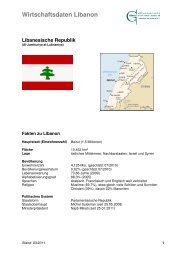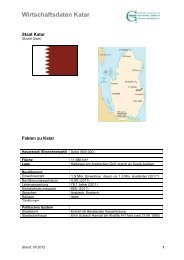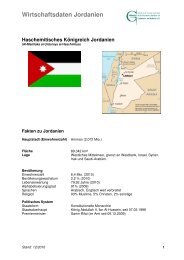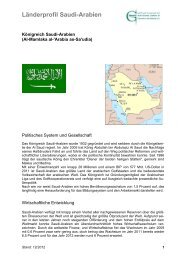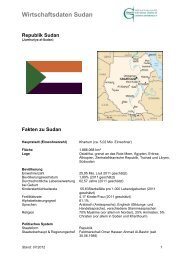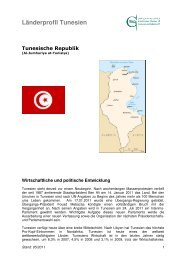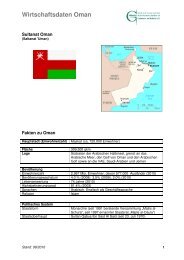Saudi-Arabien Wirtschaftshandbuch Saudi Arabia Business ... - Ghorfa
Saudi-Arabien Wirtschaftshandbuch Saudi Arabia Business ... - Ghorfa
Saudi-Arabien Wirtschaftshandbuch Saudi Arabia Business ... - Ghorfa
Sie wollen auch ein ePaper? Erhöhen Sie die Reichweite Ihrer Titel.
YUMPU macht aus Druck-PDFs automatisch weboptimierte ePaper, die Google liebt.
120<br />
More than 100 public companies are currently registered<br />
and traded on the Tadawul. This number has grown constantly<br />
in recent years, in particular because large <strong>Saudi</strong><br />
trading companies have recognised that the public company<br />
organisation and the at least partial trade with<br />
shares of a company of this kind offers benefits and raises<br />
competitiveness. For this reason, the trend of converting<br />
to public companies looks set to continue.<br />
how to found a company – an example<br />
The following steps need to be taken to form a limited<br />
company for industrial production:<br />
– Concept<br />
– Selection of a suitable partner<br />
– Checking the availability of an infrastructure<br />
– Market study (for internal use only)<br />
– Economic analysis (for internal use and for<br />
applying for a SIDF loan and loans from<br />
commercial banks)<br />
– Initial review of the existence of land available<br />
for leasing or purchase<br />
– Shareholder agreement<br />
– Technical study for the production plant<br />
– Submission of the licence application to the SAGIA<br />
– Initial contact with the SIDF<br />
– Receipt of the investment licence<br />
– Drafting of the articles of association<br />
– Application for registration of the company at the<br />
Ministry of Trade and Industry<br />
– Receipt of the notarized copy of the articles of<br />
association<br />
– Publishing of a summary of the articles of association<br />
in the <strong>Saudi</strong> official gazette<br />
– Membership of the responsible Chambers of Industry<br />
and Commerce<br />
– Opening a bank account<br />
– Paying the registered capitals into the bank account<br />
– Receipt of the excerpt of the commercial register<br />
– Registration with the custom authorities,<br />
passport office, labour office and the<br />
tax office (DZIT)<br />
– Transfer of the real estate<br />
– Loan agreement with the SIDF<br />
– Completion of the agreements for the construction<br />
of a factory<br />
– Planning permission<br />
– Construction work<br />
– Import of machines, installation and<br />
commissioning<br />
– Start of production.<br />
other company and subsidiary forms<br />
The <strong>Saudi</strong> Companies Law not only recognises the<br />
above-mentioned limited company and public company<br />
but also other company forms that are hardly relevant for<br />
the foreign investor. They are mentioned here for reasons<br />
of completeness:<br />
– General partnership<br />
– Limited partnership<br />
– Silent partnership<br />
– Partnership limited by shares<br />
When issuing licences by the SAGIA, only the limited<br />
company as defined by <strong>Saudi</strong> law is used regularly to licence<br />
foreign investments. The public company is reserved<br />
for <strong>Saudi</strong>-<strong>Arabia</strong>n citizens and citizens of the GCC members<br />
states. The other presence forms of the Companies<br />
Law are only permitted for domestic companies.<br />
Finally, there is also the “Establishment”, which is a company<br />
form widely used by single businessman. However<br />
this is primarily only used by <strong>Saudi</strong> small to mediumsized<br />
companies.<br />
––––––––––––––––––––––––––––––––––<br />
hAnDelSVerTreTerrechT<br />
Das saudische Handelsvertretergesetz (HVG) und seine<br />
Ausführungsbestimmungen (HVG-AB) unterscheiden<br />
zwischen dem Handelsvertreter (Commercial Agent)<br />
und dem Vertragshändler (Distributor). Diese Unterscheidung<br />
gründet auf der Arbeitsweise, wird also inhaltlich<br />
gemacht, führt aber – im Unterschied zu deutschem<br />
Recht – nicht zu rechtlichen Konsequenzen.<br />
Rechtlich sind beide gleichgestellt.<br />
handelsvertreter / Vertragshändler<br />
Der Handelsvertreter (Commercial Agent) vermittelt<br />
gegen Zahlung einer Kommission den Abschluss von<br />
Geschäften zwischen dem ausländischen Produzenten<br />
und dem lokalen Kunden. Der Vertragshändler oder<br />
Eigenhändler (Distributor) handelt als unabhängiger<br />
Händler auf eigene Rechnung und eigenes Risiko. Er<br />
kauft also die Produkte vom Produzenten und verkauft<br />
diese in eigenem Namen und auf eigene Rechnung weiter<br />
in den Markt. Art. 1 HVG-AB enthält diese Unterscheidung,<br />
definiert jedoch nicht den Unterschied, sondern<br />
nimmt die Unterscheidbarkeit als gegeben hin.







